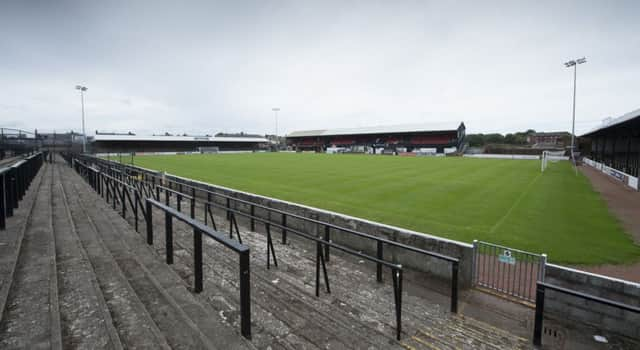Patrick McPartlin: Time for Ayr's marketing to reflect on-field progress


I’ve got a bit of a soft spot for Ayr United, due to my great uncle James spending time at the club in the first half of the 20th century. Somerset Park always feels like a “real” football stadium, with real character and plenty of memories ghosting around the terraces, and the fact it hasn’t changed much since James was there makes trips to the ground a bit special.
The Honest Men have had a fine season so far, and are currently topping League One having scored over 100 goals in all competitions.
Advertisement
Hide AdAdvertisement
Hide AdSo the fact that glamour models in bodypaint are being employed as PR stunts to promote the club’s new kits doesn’t sit right with me and, judging by the comments I’ve read online, isn’t particularly appreciated by the bulk of the club’s fans.
It’s not the first time a new Ayr strip has been launched in this manner. In 2016, equality groups hit out at a similar kit launch, and one FIFA executive committee member branded it “soft porn” and “atrocious”.
Chairman Lachlan Cameron said in response to the negative reaction at the time: “Just because someone finds something offensive in life doesn’t mean it actually is.”
But Cameron’s dismissal of the complaints doesn’t make it any more palatable - and it certainly doesn’t cut it two years later, with a background of the #MeToo movement. The inclusion of a male model wearing bodypaint in this year’s promo, in what was presumably an effort to escape accusations of sexism, was all too predictable, and only served to highlight the fact that a backlash was expected.
The glamour model approach is solely the work of the sponsor, rather than the club, and the promotional pictures are notably, and perhaps pointedly, absent from Ayr’s official social media channels. There was little fanfare to accompany the official announcement on the club’s website.
The man behind the club’s sponsor deal, Canadian entrepreneur Calvin Ayre, has been financially supporting the club since May 2011, after learning his ancestors hailed from Ayrshire. His online betting firm Bodog was the club’s shirt sponsor for seven years, until a few days ago when the new deal was announced with CoinGeek.com - although the new kits will be branded with Bitcoin Cash, a cryptocurrency that was used to pay for the sponsorship deal.
Ayre was only too happy to promote “his” photoshoot on social media, proclaiming it to be a “bit better” than Ayr’s effort. The club had taken the relatively standard approach of photographing two players wearing the home and away shirts at the team’s Player of the Year awards evening.
Of course, it’s a win-win situation for Ayre and - previously Bodog - CoinGeek.com, regardless of what the club does. His self-styled “ever controversial kit launches” are widely covered by the world’s media, gaining greater exposure for Ayre and his ventures, but the club feels like a bit of an afterthought; a convenient vehicle to boost Ayre’s profile with little or no consideration for the wider impact on a family club like Ayr United.
Advertisement
Hide AdAdvertisement
Hide AdAyr can’t be blamed for trying to get the best financial deal they can, at a time when there is very little money in the lower echelons of Scottish football. Given the choice I’m sure fans would rather have the money, and their club’s future safeguarded and a better standard of player wearing the shirt, but there must be better ways of boosting publicity than reducing women to a marketing tool. A cursory glance at some of the smaller, newer teams in the United States who are building themselves up from a similar position to Ayr, and the manner in which they seek to market themselves, wouldn’t do any harm for instance.
We should certainly be encouraging and welcoming imaginative and inventive ways of promoting a club or product, and there have been some fantastic examples over the course of this season alone - Motherwell’s “Time for New Heroes” mini-film, or Dumbarton’s pre-Challenge Cup final video are just two examples right on Ayr’s doorstep.
At a time when some clubs are actively trying to encourage more female spectators, stunts like this are jarring. It helps foster the “man’s game” mentality, together with the small percentage of fans who wolf-whistle at female physios, or still aim homophobic slurs at players if they take a sore one in a tackle or make crude references to the offside rule whenever a female assistant referee is running the line.
It’s ironic that, in an era when VAR and goal-line technology is being debated across the globe, injured footballers are Snapchatting videos of their treatment on the pitch and Formula 1 chiefs are calling time on so-called grid girls, a club’s sponsor feels a 1970s throwback is - repeatedly - the right direction to ensure coverage. But, as the saying goes, if it ain’t broke, why fix it, and with the amount of articles both in print and online about Ayre’s kit launches, the Canadian millionaire has little reason to change course.
But if we’re happy enough to express our shock and disappointment, for example, at male footballers being abused over mental health issues during matches, as we were when Cowdenbeath’s David Cox opened up about the taunting he endured over his depression, shouldn’t we also be disappointed about half-naked women being used to flog football kits in 2018, when so many in the game - male and female, and at all levels from grassroots to the Scottish top flight - are busting a gut trying to take the sport forward?